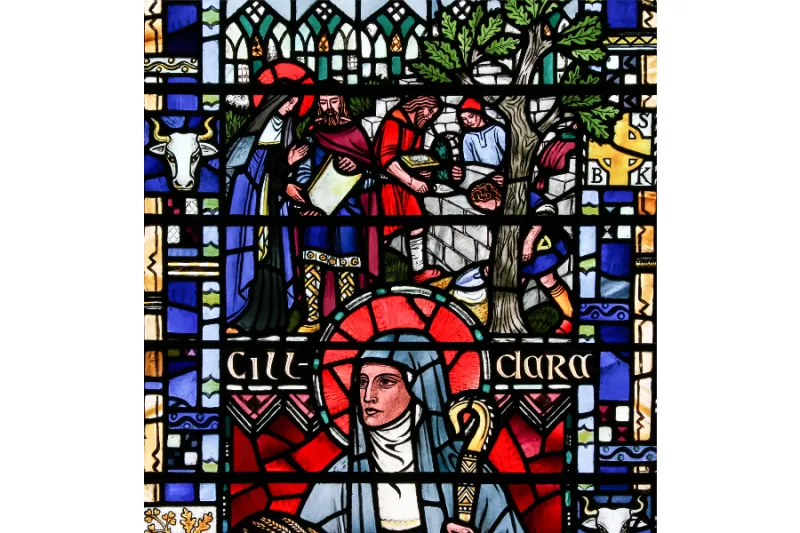
Public holiday marking St Brigid’s feast established in Ireland
 St. Brigid of Kildare building the Church of the Oak, detail from a window of St Etheldreda’s church in London. / Lawrence OP via Flickr (CC BY-NC-ND 2.0)
St. Brigid of Kildare building the Church of the Oak, detail from a window of St Etheldreda’s church in London. / Lawrence OP via Flickr (CC BY-NC-ND 2.0)
Dublin, Ireland, Feb 1, 2022 / 03:00 am (CNA).
The feast of St. Brigid of Kildare, Ireland’s female patron saint, will be a public holiday in the Republic of Ireland beginning in 2023, it was recently announced.
Her feast is Feb. 1, and the bank holiday will be observed on the first Monday in February, or on Feb. 1 when that day falls on a Friday.
The public holiday was welcomed by the Catholic and Anglican bishops of Kildare.
“It is very appropriate that a new public holiday will honour Saint Brigid. As the secondary saint in Ireland to Patrick, for too long she has been lost in his shadow. We warmly welcome the news that Brigid is being rightly, and long after time, acknowledged,” Bishop Denis Nulty of Kildare and Leighlin, and Pat Storey, the Church of Ireland’s Bishop of Meath & Kildare, said Jan. 27.
Leo Varadkar, Ireland’s Tánaiste, said Jan. 20 that “From next year, Ireland will have an extra public holiday at the start of February to mark Imbolc/St Brigid’s day … This will be the first Irish public holiday named after a woman. It marks the half-way point between the winter solstice and the equinox, the beginning of spring and the Celtic New Year. The creation of a tenth public holiday will bring Ireland more into line with the European average and it is one of five new workers’ rights that I am establishing this year.”
The fifth century abbess St. Brigid is one of Ireland’s three patron saints, along with St. Patrick and St. Columba. Most historians place her birth around the year 450, near the end of St. Patrick’s evangelistic mission.
Brigid was born out of wedlock to a pagan cheiftain named Dubthach and a Christian slave woman named Broicsech. The chieftain sold the child’s pregnant mother to a new master, but contracted for Brigid to be returned to him eventually. According to one of the more credible biographies of Brigid, Hugh de Blacam’s essay in “The Saints of Ireland,” the child was probably baptized as an infant and raised as a Catholic by her mother. Thus, she was well formed in the faith before leaving Broicsech’s slave quarters, at around age 10, to live with Dubthach and his wife.
After this, Brigid’s faith grew immensely. She gave generously to the poor and tended to the sick. One story says Brigid once gave away her mother’s entire store of butter, which was later replenished after Brigid prayed.
Once she was released from servitude, she was expected to marry. However, Brigid had no interest in marrying. She went so far as to disfigure her own face and prayed that her beauty be taken from her so no one would want to marry her. Because she refused to change her mind about marriage, she received permission to enter religious life.
Brigid, along with seven friends, is credited with organizing communal consecrated religious life for women in Ireland.
In 480, Brigid founded her monastery in Kildare, called “Church of the Oak”. The monastery sat on top of a shrine to the Celtic goddess Brigid. Throughout the rest of her life, she established several monasteries across Ireland.
Brigid rooted her life as a nun in prayer, but she also performed substantial manual labor: cloth making, dairy farming, and raising sheep. She also spent time traveling across Ireland founding new houses and building up a uniquely Irish form of monasticism. When she was not traveling, pilgrims made their way to Kildare, seeking the advice of the abbess.
Brigid died around 525.
Bishop Nulty and Pat Storey noted in their statement that “Every school child knows the song of Brigid and how her cloak covered the area we know today as the Curragh, Saint Brigid’s Field. Brigid is linked with the earth, with agriculture, particularly ploughing, sowing, milking, butter-making and, of course, vibrant Christian faith. Brigid was extravagant in her hospitality.”




